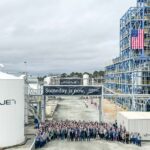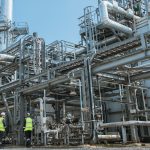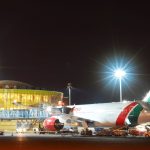As part of a multi-million-pound investment programme to overhaul and reduce emissions from its ground fleet at London’s Heathrow Airport, more than 90% of British Airways’ vehicles and ground support equipment (GSE) are now either zero emissions electrical equipment when used or driven, hybrids or are operating on hydrotreated vegetable oil (HVO) fuel. The airline has further plans over the next two years for switching other equipment and vehicles to electric, hybrid or HVO. As well as saving CO2 emissions, the changes are aimed at reducing negative air quality impacts around the Heathrow area. Heathrow Airport itself has switched over 95% of its operational diesel fleet to run on HVO. It has also launched an initiative, the Heathrow Fly Up, to create awareness among travellers in response to a survey showing only 14% had heard of sustainable aviation fuels.
The ground energy transition programme at Heathrow by British Airways is part of a £7 billion ($9bn) investment plan unveiled recently by the airline to transform many parts of its business over the next three years.
“We are committed to reaching net zero emissions by 2050 or sooner and our focus isn’t just about reducing emissions in the air, but on the ground too,” commented Tom Moran, British Airways’ Director of Heathrow. “This major investment into our vehicles at Heathrow is our largest investment in more sustainable airport ground operations to date and is part of our wider environmental objective to minimise emissions from our airside ground operation.”
Having replaced more than 750 pieces of GSE with HVO-fuelled versions last year, BA is this year introducing 135 new electric baggage tugs that will use new energy-efficient chargers. Over the next two years, it will replace diesel passenger aircraft steps with electric alternatives, saving 370 tonnes of CO2 emissions per year, swapping diesel-powered cargo vehicles with hybrid electric versions and replacing all diesel passenger buses with electric or HVO versions that will save 800 tonnes of CO2 emissions annually. A large charging park is now in the early stages of development at the airport.
Replacing the use of diesel with HVO in GSE is an interim measure, says BA, while it gradually transitions to zero emissions or hybrid equipment. Provided by the airline’s current SAF supplier Phillips 66, the use of HVO is anticipated to save more than 6,000 tonnes of CO2 per year compared to traditional diesel fuel, the equivalent of more than 8,000 round-trip economy passenger journeys between Heathrow and New York JFK, it says.
“I am incredibly proud of this project, which has been driven by our Heathrow ground operations teams and encapsulates our BA Better World ethos of raising awareness of our strategy to all of our colleagues, and inspiring them to play a part in minimising our environmental impact where possible,” said Carrie Harris, Director of Sustainability at British Airways. ”Their energy, enthusiasm and innovative approach in bringing the project to life shows what can be achieved and this investment demonstrates our ongoing commitment to making improvements across our business that will benefit both our customers and colleagues.”
The airline has just published its latest sustainability report, BA Better World Report 2023, which shows it reduced carbon intensity in 2023 to 86.2g CO2/epk (equivalent passenger km) – 10% lower than pre-pandemic levels in 2019 and a 3% intensity improvement from 2022. Intensity performance declined to 110g CO2/pkm (passenger km) in 2020, at the height of the Covid pandemic, and has recovered steadily since then. Emissions from jet fuel consumption fell from just over 19 million tonnes in 2019 to just under 15 million tonnes in 2023, a fall of 21%.
The airline reports using more than 50,000 tonnes of sustainable aviation fuel in 2023, representing 1% of total fuel supply, a five-fold increase on the 9,980 tonnes of SAF utilised in 2022, and mitigating around 150,000 tonnes of CO2 in lifecycle emissions. BA helped corporate and cargo customers reduce over 142,000 tonnes of their Scope 3 emissions in 2023. It is aiming to reach 10% SAF usage by 2030.
Meanwhile, Heathrow Airport has set a goal for 11% of the jet fuel used at the airport to be SAF by 2030. Its pioneering scheme to incentivise the use of SAF at the airport by approximately halving the price gap between conventional jet fuel and SAF to make it more affordable to airlines has, it says, resulted in around 10% of the world’s SAF being used at Heathrow in 2022. The scheme is targeting 2.5% of all fuel used at Heathrow to be SAF in 2024, representing up to 155,000 tonnes of fuel.
Heathrow says SAF is the single biggest driver to help it reach net zero by 2050 and is trying to raise its importance and understanding to travellers passing through the airport. It has launched a “biofuel breakfast”, dubbed the Fly Up, in association with Heston Blumenthal’s Perfectionists’ Café in Terminal 2, which is cooked with oil that is then collected, cleaned and recycled by waste management service Quatra. The processed used oil is then sent elsewhere to be transformed into biofuels including SAF and HVO.

The Heathrow Fly Up
In addition to just 14% of travellers having heard of SAF, new research by Opinium of 2,000 UK adults reveals only 27% believe SAF will make the aviation industry more sustainable. Heathrow says it is actively encouraging passengers to use climate tech company CHOOOSE that has a platform to provide an option to support SAF or certified reforestation projects, regardless of their airline or end destination.
“We are delighted to partner with Heston Blumenthal’s Perfectionists’ Café to introduce the Fly Up, a breakfast that not only gives passengers a delicious start to the day but will raise awareness about SAF and its potential to transform the industry,” said Matt Gorman, Heathrow’s Director of Carbon. “By demonstrating how cooking oils can be converted into biofuels, we want people to understand how SAF is a real solution to decarbonise aviation and show how we’re continuing our mission to get to net zero by 2050.”
Top photo: British Airways HVO fuel tanker at Heathrow
















More News & Features
EU states to mobilise 500 million euro support for early-mover eSAF production startups
LanzaJet produces first next generation, ethanol-based SAF at flagship Freedom Pines refinery
European Commission announces Sustainable Transport Investment Plan to advance low-and-no-carbon fuels
XCF plans three new Australian SAF plants, while Wagner and FlyOro activate blending facility
UK government starts new consultation on SAF revenue certainty mechanism
African Development Bank and Japanese industrialist unite to explore SAF production in Africa